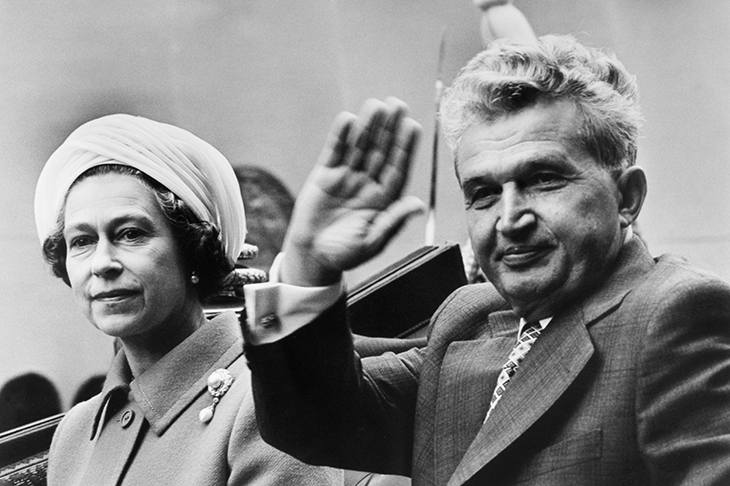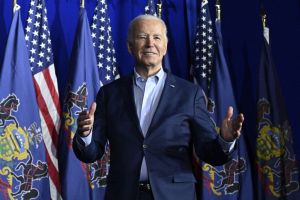The Queen has seldom had more holes in a state banquet seating plan. The leader of the opposition, the shadow foreign secretary, the Speaker and the leader of the Liberal Democrats have all ostentatiously refused ‘Her Majesty’s command’ to attend her banquet in honor of Donald Trump next week. The fact that the dinner is in honor of our greatest ally — and in the week we celebrate D-Day — seems to matter less than virtue points on social media.
Few will appreciate the irony of this petty posturing more than the Queen herself. For it is that same tranche of the liberal elite who remain responsible for the worst state visit of her reign.
It was a Labour prime minister, Harold Wilson, who invited the brutal Romanian despot Nicolae Ceausescu and his equally ghastly wife, Elena, to pay a state visit to Buckingham Palace in June 1978. By the time they arrived, Wilson had been replaced by Jim Callaghan, who was just as enthusiastic, as was the leader of the Liberal party. David Steel even presented the dictator with a labrador puppy called Gladstone (later renamed Corbu and promoted to honorary colonel in the Romanian army).
None cheered louder than the one paper granted an exclusive interview with Ceausescu ahead of the visit.
‘Mr Ceausescu,’ gushed the Guardian’s Hella Pick, ‘has shown immense courage in asserting Romania’s independence from the Russians and encouraging Romania’s nationalism.’
That same nationalism lay behind the ruthless persecution of millions of ethnic Hungarians, not that this was of any great concern to the left, let alone to ministers. Their sole concern was a £300 million deal for British airliners.
Ceausescu was a communist with an eye for commerce. Exploring previously classified Foreign Office files for my book Queen of the World, I found that the Foreign Office was inundated with requests for introductions. British Aerospace even offered to send Ceausescu home by Concorde. A pecking order was established. The chairmen of Shell and ICI plus the director-general of the BBC would be invited to the Queen’s state banquet, whereas ITN’s head of current affairs would have to make do with the PM’s lunch the next day.
There was one big hurdle, however. A nervous memo from the British Embassy in Bucharest warned that the Romanians had ‘dropped a number of strong hints that Mrs Ceausescu would be pleased to receive some kind of academic distinction.’ Her scientific credentials were bogus but the visit could be in jeopardy if she didn’t get something. The Foreign Office asked Harold Wilson to lean on the University of Bradford, since he was its chancellor. He failed. No joy at Heriot-Watt, Sussex, Liverpool or Southampton either. Imperial College refused, although a Ceausescu son had studied there. By now, Kenneth Scott, head of the FCO’s Eastern European department, feared a leak ‘that the FCO are hawking Madame Ceausescu’s somewhat dubious wares around.’
With just a month to go, the Polytechnic of Central London came to the rescue with an honorary professorship while the Royal Institute of Chemistry produced a fellowship. Panic over.
The Foreign Office — and the Palace — were under no illusions about Ceausescu’s nastiness. ‘He is as absolute a dictator as could be found in the world today,’ the British ambassador to Romania, Reggie Secondé, wrote in a profile for his bosses. Elena Ceausescu was a ‘viper’ who ‘likes shopping,’ their children were ‘feckless.’ There had been ‘disastrous’ scenes on Ceausescu’s recent visit to Belgium, where his guards had ‘scrambled for places at the dinner table.’ On a tour of the US, they had demanded free fur coats. On the plus side, Ceausescu was ‘well disposed towards Britain.’ There was one golden rule: ‘Constant praise for Ceausescu’s international statesmanship is very much in order.’
With just days to go, the foreign secretary, David Owen, was having serious doubts. ‘Who agreed to this visit?” he wrote on an internal memo to his private secretary, Ewen Fergusson. ‘Did I? If I did, I regret it.’
The Queen also received a call from president Giscard d’Estaing of France. He warned her that, during a recent stay in Paris, the Ceausescus had looted their quarters and had even hacked holes in the walls looking for bugging devices. The Queen passed it all on. ‘They were advised to move the silver brushes from the Palace dressing table or the Romanians would pinch the lot,’ former cabinet secretary Lord (Robin) Butler recalls.
In fact, Ceausescu was on his best behavior for the Queen. ‘He did exactly what he was told to do,’ says Sir Roger Du Boulay, former vice-marshal of the Diplomatic Corps. The Royal Family produced the full works — carriages to the Palace, tea with the Queen Mother, gifts (a hunting rifle and the Order of the Bath for him; a gold brooch for her). The state banquet was an odd affair with the British in white tie and the Romanians in lounge suits. With nothing in common between the two heads of state, the speeches were as underwhelming as the wine — plonk by royal standards. Yet the Romanian press presented the visit as a landmark in modern history, as did Central London Poly. Elena Ceausescu arrived to hear Professor Terence Burlin, senior pro-rector, hail her as ‘a woman of discernment’ and ‘a fine example of Heisenberg’s epigram: “Science clears the field on which technology can build”.’
The Queen had already had enough of her visitors. While out walking her dogs in the garden, she spotted the Ceausescus coming the other way and actually hid behind a bush to avoid them.
Nothing, however, was to jeopardize the £300 million plane contract. When Romanian dissidents staged a wholly peaceful demonstration outside one venue, the police parked a coach in front of them and arrested their leader, Ion Ratiu.
Finally, Callaghan got his deal. It was all in vain, of course. A mere nine BAC 1-11 aircraft had been built by the time the Ceausescus were put up against a wall and shot 11 years later.
To this day, their state visit remains a low point in British diplomacy. When I asked David Owen why there is no mention of it in his memoirs, he was commendably frank: ‘I try to pretend it never happened.’
The Queen, however, has never forgotten the guest she calls ‘that frightful little man.’
It makes it all the more risible to hear politicians like Sir Vince Cable claiming that Donald Trump’s state visit will somehow ‘embarrass the Queen.’ It will do nothing of the sort. For real embarrassment, rewind to 1978. Sir Vince might at least have the decency to apologize, on behalf of his party, for Colonel Corbu, the labrador pup.
This article was originally published in The Spectator magazine.


















